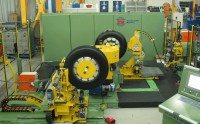Michelin enlarges its fleet service portfolio
 Knights of old relied on armour; logistics specialist Knights of Old benefits from a robust Michelin casing…
Knights of old relied on armour; logistics specialist Knights of Old benefits from a robust Michelin casing…
Historically, many fleets have taken a short-term view of their tyre policy and failed to plan ahead. This is particularly the case for fleets facing immediate pressures, as the temptation not to consider three years in the future is strong for operators who are uncertain if they’ll even remain in business that long. Yet short-term savings can prove costlier in the long run, and Michelin opines that fleet operators need to consider their tyre choice in a similar way to their vehicle choice – they need to ensure it is right for the application and vehicle.
Sharn Samra, head of truck marketing for Michelin in UK and Republic of Ireland, says Michelin sees long-term benefits as far outweighing the short-term approach – she sums the pitfalls of the latter with the well-known phrase: Buy cheap, buy twice. “Our model is about making tyres last longer so that people buy fewer tyres,” Samra adds. “Buying fewer tyres may not sound like a good thing for Michelin but it actually is, as when customers receive a good, long-lasting product they become repeat customers. In addition to premium new products, the Michelin model involves a service provider, be it ATS Euromaster or independent Michelin Truck Professional dealers, and includes multiple tyre lives through regrooving and retreading. Total cost of ownership, or total value of ownership as we call it, is the important thing.”
This begins right at the start. Michelin Fleet Solutions employs a team of ‘road staff’, account managers whose numerous tasks include providing free advice on specifying the right tyre for the application. Samra comments that advising on and selecting application-specific tyres “is the cheapest approach for customers as it offers the best chance of making the most out of a premium tyre’s multiple lives.”
The application-specific products Michelin currently offers are the X Line Energy, MultiWay, X Multi, X Works and XML. The long-haul oriented X Line Energy was introduced last year and Samra describes it as Michelin’s fuel saving range (For more details, see our IAA report on pages 60-65 of T&A 10/2012). The MultiWay is a ‘balanced tyre’ intended for regional use, longevity and fuel saving, while the X Multi range has been added to with the new X Multi D for 16 tonnes and below. “We are seeing a need for a premium tyre offer for smaller trucks,” comments Samra. “Many of these make deliveries and time is priority for these operators. They need a robust tyre that performs in all weather conditions. We have more product launches for this range scheduled for 2014.” Fleets operating in construction sites may find the X Works meets their requirements, and the head of truck marketing points out that Michelin offers a damage guarantee for this tyre. For customers whose vehicles are more off-road than on there is the XML, which Samra describes as a range of “strong, robust tyres with casing value and longevity.”
Returning to the issue of short-term mentality towards tyre policy, it is no surprise that the price of premium new tyres acts as a deterrent for some operators. Yet Samra counters that forward-looking fleets look beyond initial purchase price and appreciate the significance of tyre life – a quality she notes is not addressed by the European tyre label. For these fleets, retreading and regrooving is not just an environmental factor, rather it counts as a ‘pound in your pocket’ business consideration. “Michelin has a multi-life policy and to encourage this has made a massive investment at its Remix plant in Stoke-on-Trent – in some cases fleets are almost getting six lives out of a tyre, getting value from the product thanks to its Michelin casing. Michelin casings are valued by fleet users for their robustness.”
Seeing to casing wellbeing is an element of Michelin tyre policy and this is part a responsibility of the aforementioned account managers, who make sure customers can get the maximum out of their tyres. “Our road staff are trained in customer education and ensure the customer works with the right service provider,” says Samra. Establishing a solid connection between customer and service provider is an invaluable task, as the head of truck marketing observes that fleet operators sometimes underestimate the service provider’s role. “But it is the service provider who maintains the fleet’s chosen policy, ensures tyre pressures are correct and handles twinning and alignment, and through this can potentially save a customer the greatest amount of money. Working strongly with the service provider is very important, and prompt service is vital.”
Michelin solutions and Effifuel
Supplementing the fleet services Michelin offers is a new division the Michelin Group introduced several months ago. ‘Michelin solutions’ was launched in the European market in May 2013 and replaces the division previously known in the UK as Michelin Fleet Solutions. Michelin solutions will be introduced in the Americas and China in 2014 and 2015 and the division has set the ball rolling here with a new solution aimed at both hauliers and own-account operators – Effifuel. This initiative is designed to help customers contain and reduce fuel costs and sees Michelin solutions working with fleets (with single marque or mixed tyre brands) to define a contractual commitment based on fuel savings and the resources to be deployed to attain them. The savings generated by the solution will be shared by the partners.
Weapons in the Michelin solutions fuel-reduction arsenal include eco-driving training courses and the monitoring of driver behaviour at the wheel, based on individual eco-scores and the installation of telematics display units. Fuel analysts from within Michelin solutions can assist in gathering and studying data on the influences of fuel consumption, whilst also optimising tyre management through pence-per-kilometre tyre pricing and a fitment strategy aimed at reducing fuel consumption. This can include the installation of tyre pressure monitoring systems (TPMS) to improve the safety of the driver, vehicle and its cargo.
“Some of these services already exist individually,” explains Franck Estoquié, chief marketing officer at Michelin solutions. “What’s new is to be able to package them together in the same solution, manage them efficiently and make a long-term commitment.”
When working with a new fleet, Michelin solutions initially conducts a detailed audit of vehicle types, current tyres, itineraries, vehicle operating weights and driver habits, before helping to define an objective efficiency savings target, measured in litres per 100 kilometres. Once a savings structure is in place, Michelin solutions can offer fleets commitments to meet those targets over periods of up to four years.
Throughout the contract period Michelin solutions’ own fuel analysts conduct in-depth studies and regular fleet reports. Estoquié says the idea is “not to replace fleet managers but to provide them with resources, visibility and advice to optimise their operations and involve us in the process.” He adds that if the joint fuel saving goal is met, Michelin solutions and the fleet share the gains. If it is not, Michelin solutions will reimburse a portion of the expenses incurred on a pro rata basis.
Label has little impact
When speaking with Sharn Samra, Tyres & Accessories asked how much influence she thinks the European tyre label has on fleet tyre purchases. Her answer is congruent with those given by other fleet service providers: “On a scale of one to ten, the tyre label’s influence on tyre purchasing is on the low side. We haven’t really seen its impact coming through on purchase orders; I’d have to say that so far the label has made little or no impact on fleet buying decisions.” She remarks that the industry as a whole strove to educate customers on what the label meant prior to and after the label’s introduction. “I feel there is still a lack of understanding however, due to the presence of only three factors. Fleet purchasers are astute, and they aren’t swayed just by these three things – they also appreciate the importance of tyre life, this is a very significant factor, and handling and dry braking are also important points they consider.”




Comments